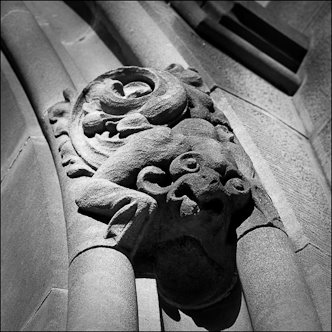I enjoyed Alexander's talk last Wed, so I thought I'd try out the discussion feature of this blog with some comments about a side-issue that came up: his objections to the idea that objects are essentially members of the natural kind of which they are actually members. The idea is that a sample of gold is essentially gold; it can't cease to be gold without ceasing to exist, and that very same thing couldn't be anything other than gold.
We had some compelling examples to the contrary; the decay of Barium to Cesium for one. A sample of Barium changes very little when it becomes Cesium. It loses only a tiny part of its mass. Surely the thing still exists, it's just that it's now a member of a different kind.
This example and all the other ones were examples of something persisting but as a member of a different kind. One thought is that if you are a four-dimensionalist, a persisting thing is just a fusion of temporal parts -- so it's not obvious why it can't be a fusion of things that are themselves members of various kinds. The persistence criteria for objects are usually causal ones -- each later temporal part has to be caused in the right way by the earlier one -- and in all of Alex's examples, this was plausibly the case despite the earlier being a member of a different kind that the later.
But none of that, I think, bears on the question of whether the minimal entities -- the smallest temporal parts themselves -- are essentially members of the kind that they are members of. While, as a matter of fact, I don't think that they are, I think that a defender of that doctrine who is a four dimensionalist ought think that it applies only at the fundamental level. So a particular atom-temporal-part of Barium couldn't be the very same thing without being Barium (in nearby worlds where decay happened earlier that atom-slice doesn't exist, but a Cesium one does)
So I guess I think we need an independent argument for the modal claims as applied to the temporal parts.
Read more...
